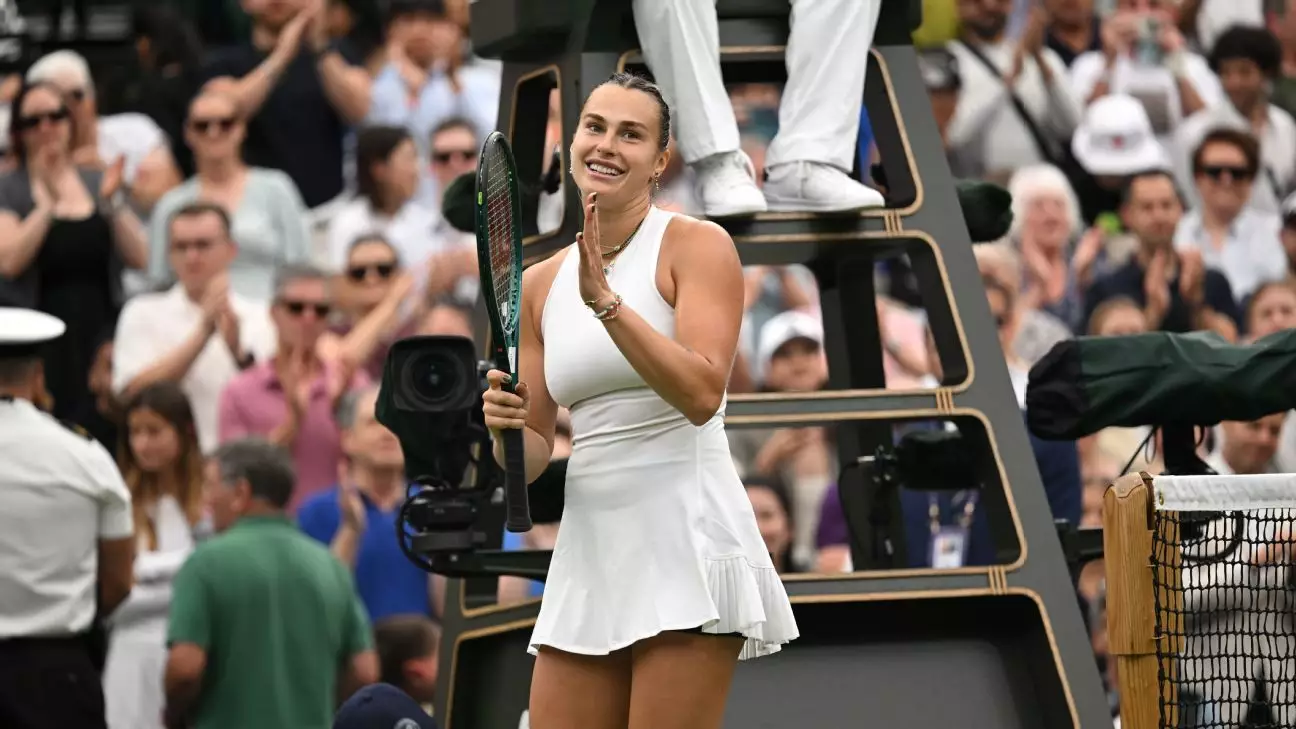Aryna Sabalenka’s victory at Wimbledon this year exemplifies not only her exceptional talent but also her unwavering determination and mental toughness. Her 6-4, 7-6 (4) win over Elise Mertens, a player she’s historically dominated, showcases her capacity to perform under pressure and her resilience in clutch moments. Sabalenka is constructing a legacy defined by relentless pursuit of excellence, recalibrating the typical narrative of early-round struggles often associated with emerging talents. Instead, she dominates the tournament with a combination of strength, athleticism, and strategic maturity, proving her to be one of the most formidable contenders not just in this tournament but across the Tour.
Her quarterfinal appearance marks her the 11th consecutive Grand Slam tournament where she has advanced to the last eight, a feat that underlines her consistency and focus. Comparing her streak to legends like Serena Williams emphasizes her exceptional edge, as she’s demonstrating that her presence at the top isn’t fleeting but enduring. The narrative building around Sabalenka is no longer just about her raw power but her ability to elevate her game when stakes are highest—a quality that distinguishes the good from the truly great in tennis.
Challenging Close Battles and Mental Fortitude
Although Sabalenka has a dominant record against Elise Mertens, their matches are never straightforward. The recent Wimbledon match followed a familiar pattern—initial dominance followed by a revival from her opponent. Sabalenka’s mastery lies in her capacity to regain composure after conceding ground, exemplified by her recovery from a 4-1 deficit in the first set. Her decisive break with a spectacular crosscourt backhand exemplifies her offensive prowess and refusal to let setbacks derail her focus.
The second set was a strategic showcase, culminating in a tense tiebreak where Sabalenka often excels. Her near-unbeatable record of 16-1 in tiebreaks this year highlights her mental fortitude and her ability to thrive in high-pressure moments that typically sway less experienced players. Her statement of happiness following her victory underscores a player who not only relishes these moments but continually hones her mental edges during the grind of a Grand Slam.
Sabalenka’s comments about the challenge of facing a close friend like Mertens reveal her awareness of the emotional and psychological complexities of her sport. It’s this blend of fierce competitive drive coupled with emotional intelligence that makes her a player capable of clinching titles amid adversity. Her ability to remain composed despite the emotional toll of “fighting a friend” illustrates the refined mental strength that dissects the myth of tennis as purely physical.
Emerging Challenges and New Opportunities
Next for Sabalenka is a match against Laura Siegemund, an underdog story in her own right. Siegemund’s journey—marking her as the oldest woman to reach her first Wimbledon quarterfinal—adds a layer of fascinating unpredictability to their encounter. Her approach of playing risk-free boldly contrasts Sabalenka’s aggressive style, and their clash promises a compelling battle of contrasting strategies, testing Sabalenka’s adaptability on grass courts.
Siegemund’s late bloom and her candid remarks about learning to harness her game for her age make her a symbol of resilience—an antidote to the often youth-obsessed narrative in professional tennis. Her gritty start in the season, coupled with her recent victories, demonstrates a player willing to challenge the conventional expectations associated with aging in tennis. Her confidence in facing Sabalenka, combined with her bold, risk-averse game plane, could make for an unexpected upset if Sabalenka underestimates her.
The support and enthusiasm of the crowd seem to have a tangible impact on Sabalenka’s performance. Her appreciation for her fans reflects a growing confidence in her ability to resonate with the audience and use that momentum to fuel her game. This emotional connection is an important factor in her continued ascent—not merely as a powerful athlete but as a compelling athlete capable of capturing the hearts of a global audience. Her journey at Wimbledon signals that her ambitions extend beyond merely reaching the quarterfinals, hinting at a deeper, unyielding desire to claim her first Grand Slam title on grass.
In a landscape filled with rising stars and seasoned veterans, Sabalenka’s relentless pursuit and her increased consistency threaten to reshape women’s tennis landscape. Her ability to thrive under pressure, combined with her evolving tactical awareness, paves the way for her to forge a legacy worthy of admiration and respect—if she can maintain her fierce focus amidst the marathon grind of Grand Slam tennis. Her current trajectory suggests she’s only just beginning to reach her full potential, and her Wimbledon run might be a sign of a new dominant era in women’s tennis.

